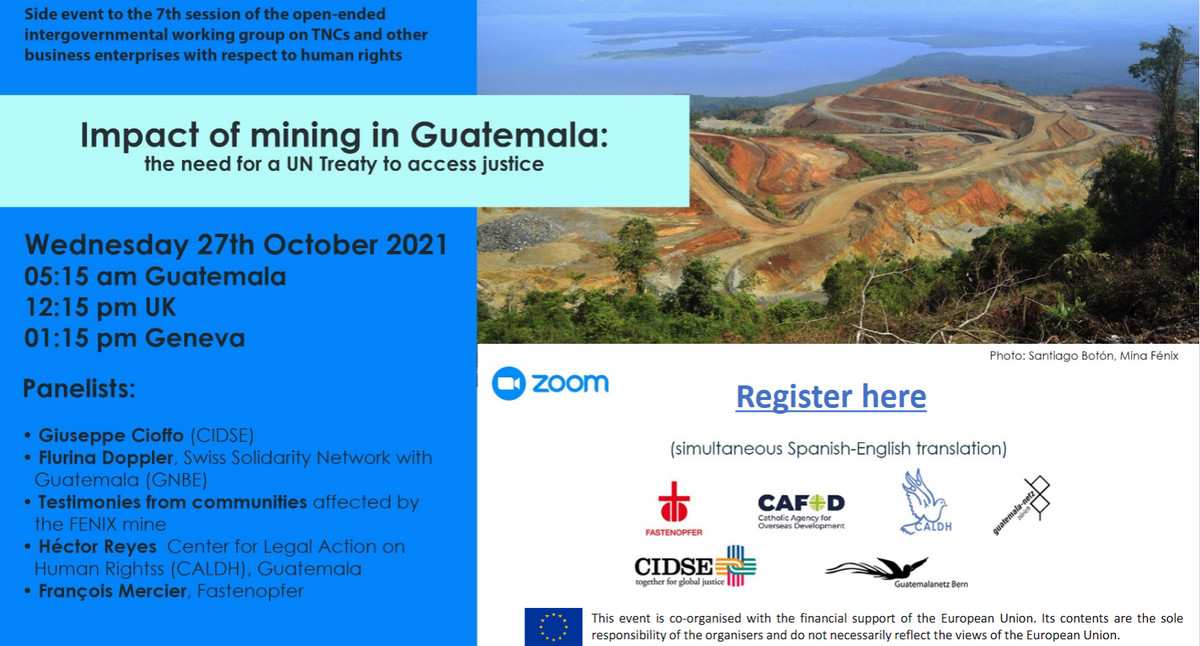Impact of mining in Guatemala
7th Session of the UN Binding Treaty – Virtual side event via Zoom
05:15 AM Guatemala, 12:15 PM UK, 01:15 PM Geneva/Brussels
PRE-REGISTRATION REQUIRED HERE
Languages: English & Spanish
Panel
- Giuseppe Cioffo, CIDSE
- Flurina Doppler, Swiss Solidarity Network with Guatemala (GN)
- Testimonies from communities affected by the FENIX mine
- Héctor Reyes, Director, Centro Para la Acción Legal en Derechos Humanos (CALDH) de Guatemala
- François Mercier, Fastenopfer
Background
In 2020, more than 1,000 cases of attacks on human rights defenders were documented in Guatemala, exceeding the year 2014 that was considered the most violent for the defence of human rights in the country, where 820 acts of violence were registered.[1] Of particular concern is the repression against the indigenous population and indigenous human rights defenders, which was denounced by UN human rights experts.[2]
The judicial system in Guatemala is widely recognised as being plagued by corruption and impunity. Reacting to recent threats against top judges, the UN Special Rapporteur on the independence of judges and lawyers stated: “If this highly disturbing trend continues, prosecutors, attorneys and witnesses in cases related to the fight against corruption or transitional justice may also come under threat.”[3] In this context, it has proved impossible for persons affected by extractives industries to be guaranteed a fair trial in their country.
In El Estor, in the northeast of Guatemala, a nickel mine named FENIX has been a threat to people and the environment for years. The indigenous population living around the mine has protested for years against the negative environmental and social impacts of the mine, and against the repression and criminalisation they are confronted with.
The FENIX mine is run by 2 subsidiaries of the Swiss-based SOLWAY Investment Group. On its website, SOLWAY presents the FENIX mine as a modern and successful project, and as a “responsible employer and neighbour” investing in environmental protection and community development.
The reports received from the local communities show a different picture: for years, there have been conflicts around mining activities and the local Maya Q’eqchi’ population – which traditionally lives in close relationship to nature – sees its livelihood threatened. According to testimonies, the environment is polluted and human rights are being violated. Local indigenous populations have been denied the right to a fair consultation according to ILO convention 169, as the Constitutional Court recently confirmed. Although the mine was ordered to stop its activities by court order last year, it is allegedly still in operation. A dialogue on an equal footing between the communities and the company could never take place.
The FENIX case illustrates the struggle of communities to defend their human, environmental and spiritual rights and the lack of effective redress and justice. It clearly demonstrates:
- the insufficiency of voluntary mechanisms,
- the importance of binding corporate regulation of transnational corporations,
- the necessity of extraterritorial liability to ensure access to justice internationally.
Speakers at this event will present the current situation in Guatemala and make the case for a strong UN treaty that will enable access to justice for affected communities, greater protection of environmental and human rights defenders, and put an end to corporate impunity. Building on calls made by communities and faith leaders globally[4], and the recent commitment by the European Union to a legislative initiative on due diligence throughout the supply chain, there is growing momentum and need internationally for a legally binding instrument on business and human rights.
Contacts for further information:
– François Mercier, Fastenopfer (mercier(at)fastenopfer.ch)
– Juan Carlos Gazol, CAFOD (jgazol(at)cafod.org.uk)
 This event is co-founded by the European Union. The contents are the sole responsibility of the organisers and can in no way be taken to reflect the views of the European Union.
This event is co-founded by the European Union. The contents are the sole responsibility of the organisers and can in no way be taken to reflect the views of the European Union.
__________________
[1] https://udefegua.org/download/file/fid/5995
[2] https://www.ohchr.org/EN/NewsEvents/Pages/DisplayNews.aspx?NewsID=27343&LangID=E
[3] https://www.ohchr.org/en/NewsEvents/Pages/DisplayNews.aspx?NewsID=27254&LangID=E
[4] Responding to this situation and inspired by the call of Pope Francis, more than 230 Catholic Bishops worldwide have signed an international statement to stop corporate abuse and guarantee global solidarity.

